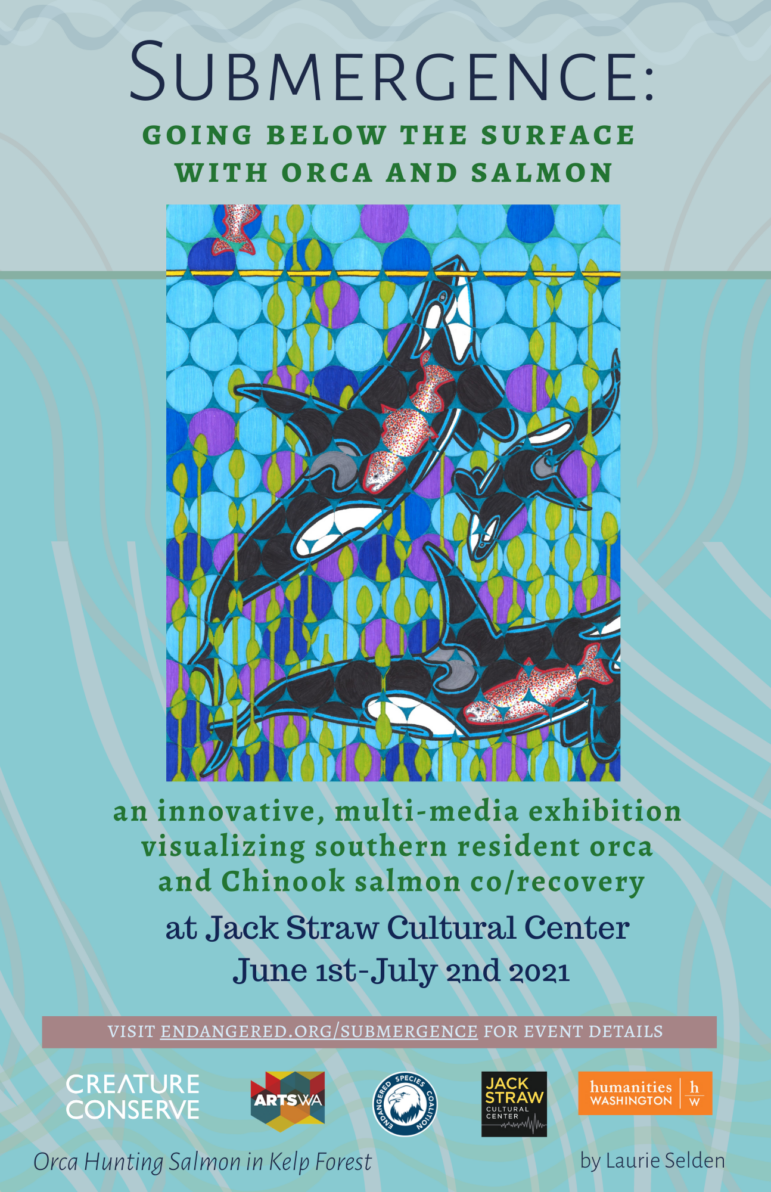
Submergence:
Going Below the Surface
with Orca and Salmon
Submergence: Going Below the Surface with Orca and Salmon is an innovative, multimedia exhibit featuring visual art, text, audio, and audio visual works, centering on the theme of southern resident orca and Chinook salmon co/recovery. Submergence will take place during Orca Month 2021, June 4th-July 2nd, 2021, at Jack Straw Cultural Center in Seattle, Washington. The Endangered Species Coalition acknowledges Seattle as the traditional territory of Coast Salish Peoples and as the past and present traditional land of the Duwamish People.
The Submergence exhibit is the culmination of a year-long workshop and event series, where artists and writers engaged with natural science and Pacific Northwest Indigenous perspectives to create works reflecting the biological and cultural significance of orca and salmon. This collaborative project is created and supported by the Endangered Species Coalition, Creature Conserve, and Jack Straw Cultural Center. We’re honored to include poems written and voiced by author Rena Priest, Lummi Nation Poet and the 2021 Washington State Poet Laureate, in the exhibition; many thanks to the Washington State Arts Commission and Humanities Washington for their support.
In addition, ESC appreciates the hundreds of people who attended and created artworks out of the orca-salmon co/recovery workshops and interacted with the project on Creature Conserve and ESC social media. We’re deeply appreciative of all our Indigenous, science and guest author presenters who participated in this series; the teachers who instructed and facilitated the workshops; the jurors who reviewed and selected work for the exhibit; all of the creatives who shared works for consideration; and the voice artists and audio engineers creating the exhibition soundscape.
We are humbly grateful to the more-than-human orca and salmon, who continue to inspire and guide the vision for this project.
Visiting the Exhibition
and Event Schedule
We welcome you to view the Submergence exhibition in-person, by scheduling the time and date of your visit with Jack Straw Cultural Center. Please note that currently, due to Covid-19, visits are by appointment only and can be scheduled Monday-Friday, between 10:00 am and 5:00 pm. Please call 206.634.0919 or email jsp@jackstraw.org to schedule your visit
https://www.facebook.com/jackstrawculturalcenterThe virtual show opening will take place on Friday, June 4th at 7:00 pm PST, featuring an introduction by curator Jeanne Dodds and virtual tour of the exhibit, including the opportunity to view the visual works in the show, hear the audio soundscape and see the video works included in the exhibition.
To participate in the Friday, June 4th opening, please visit Endangered Species Coalition’s Facebook event page at 7:00 pm PST to view the virtual, opening event.
Please join us Thursday, June 24th from 6:00-7:15 pm PST, for a live virtual reading event at Jack Straw Cultural Center and ESC’s Facebook pages. Writers with selected texts in the exhibition will read works on the theme of orca and salmon co-recovery. Artist Sophia Mc Lain, who created letterpress broadsides on display in the gallery will provide a short presentation about the letterpress process.
Submergence Visual Artists
Submergence Audio, Digital, and Video Artists
Scott Bentley – Daniel Dancer – Heather McMordie – Amelia Nommensen – S.Denise Henrikson – Vanessa Harriss – Hunter Herman – Bridget Marsch-Grim -Jennipher Brewer – Ashes Gleason – Brian Romer – Eduardo Del Signore – Jeanne Dodds – Lev Yarborough
Submergence Writers
Sarah DeWeerdt – Sandra Noel – Orin Melvin – Jayne Marek – Alicia Hokanson – Rena Priest – Christianne Balk – Gloria Vando -Miranda Mellis – Sheila Dearden – Fredda Jaffe – Ching-In Chen – Sophia McLain
Submergence Voice Actors
Karen Yarborough – Heather Cook – Ching-In Chen – Sheila Dearden – Rena Priest
Submergence Writers
Sarah DeWeerdt – Sandra Noel –Orin Melvin – Jayne Marek – Alicia Hokanson – Rena Priest – Christianne Balk – Gloria Vando -Miranda Mellis – Sheila Dearden – Fredda Jaffe –Ching-In Chen
Collaboration: The Evergreen State College and Submergence
Students in the “Conceptualizing Place: Pacific Northwest Native Art and Geographies” class at The Evergreen State College have produced a 132-page book about barriers to salmon runs, notably dams, dikes, and culverts, and how tribal nations have led alliances to remove some of the barriers in order to restore salmon habitat in Northwest watersheds. Select digital images from this publication are featured in Submergence.
In Removing Barriers: Restoring Salmon Watersheds through Tribal Alliances, narratives of the watersheds are told through text, graphics, and students’ 42 original digital artworks and maps, as students simultaneously learned Northwest Native histories, geographies, and art styles. The place-based stories of habitat restoration highlight how treaty rights and tribal sovereignty have become leading drivers of reversing damage wrought by settler colonialism, and how the healing of the watersheds and their estuaries is made possible by a process of decolonization and reindigenization in corresponding Indigenous homelands.
Under the remote supervision of faculty (artist Alexander McCarty and geographer / cartographer Zoltán Grossman), students produced Adobe Illustrator artwork and maps, with text laid out in Adobe InDesign. The twelve chapters highlighted the Nisqually, Elwha, Skokomish, Chico, White Salmon, Nooksack, White, Deschutes, Chehalis, Klamath, and Snake watersheds, as well as background on dams, and their effects on Pacific salmon, orcas, and coastal communities. The book’s theme of “removing barriers” applies to the barriers to salmon runs, barriers between human beings and the natural world, barriers between Native and non-Native communities, and barriers to Indigenous self-determination. Removing Barriers chapters can be downloaded here. Video of faculty and student presentation (49 min.) on Removing Barriers.
Resources for Artful Activism for Orca and Salmon
This video, Paper Mache Orca Calf, is for youth ages 5-12 years old, their families, and teachers to learn creative techniques for creating a paper mache orca calf, while learning about southern resident orca and Chinook salmon. You can create the orca calf from recycled materials found at home, or purchase a Community Supported Art Kit with everything you need at Orca Network (percentage of sales go to Orca Network) or the Green Art Labs Etsy page.

